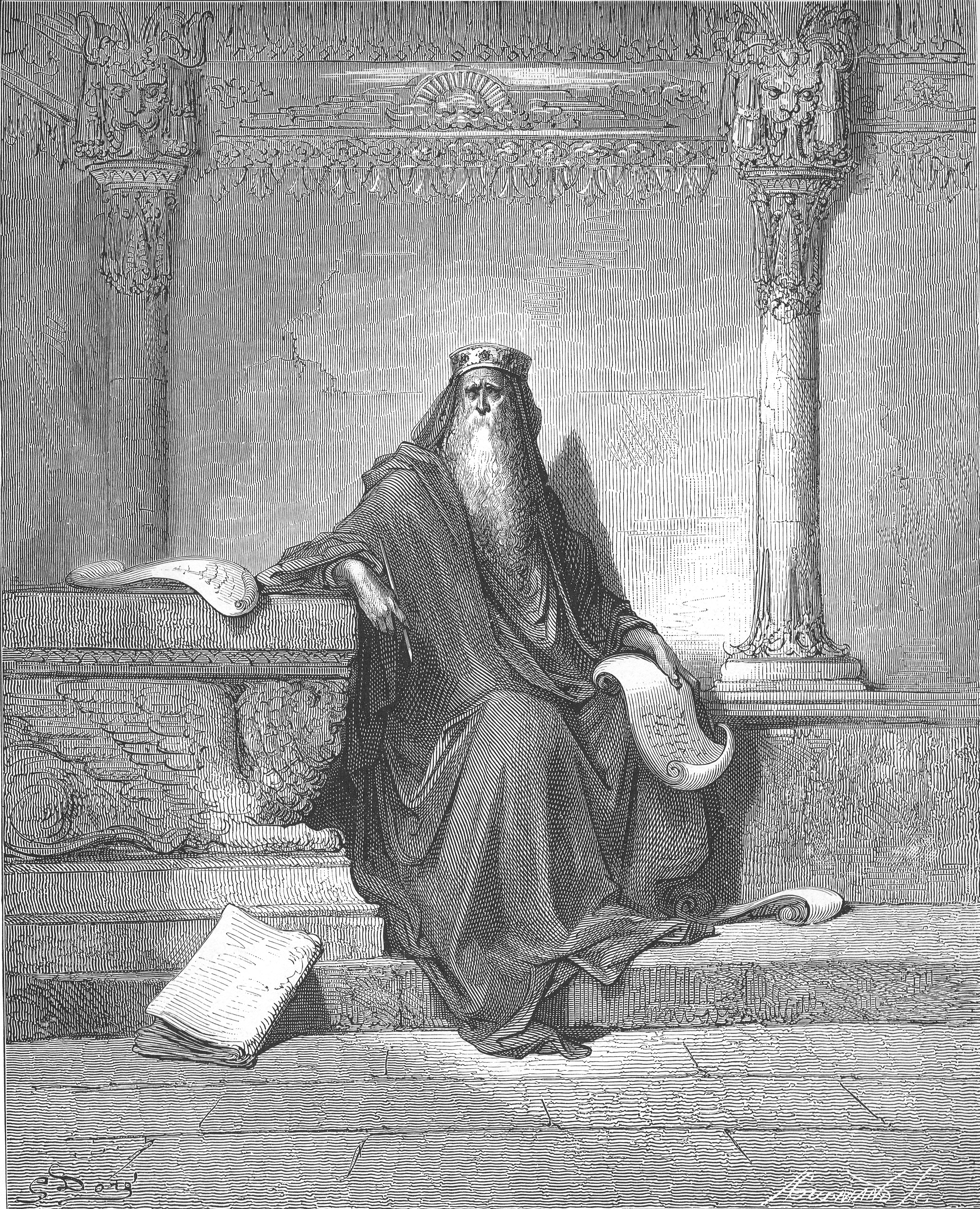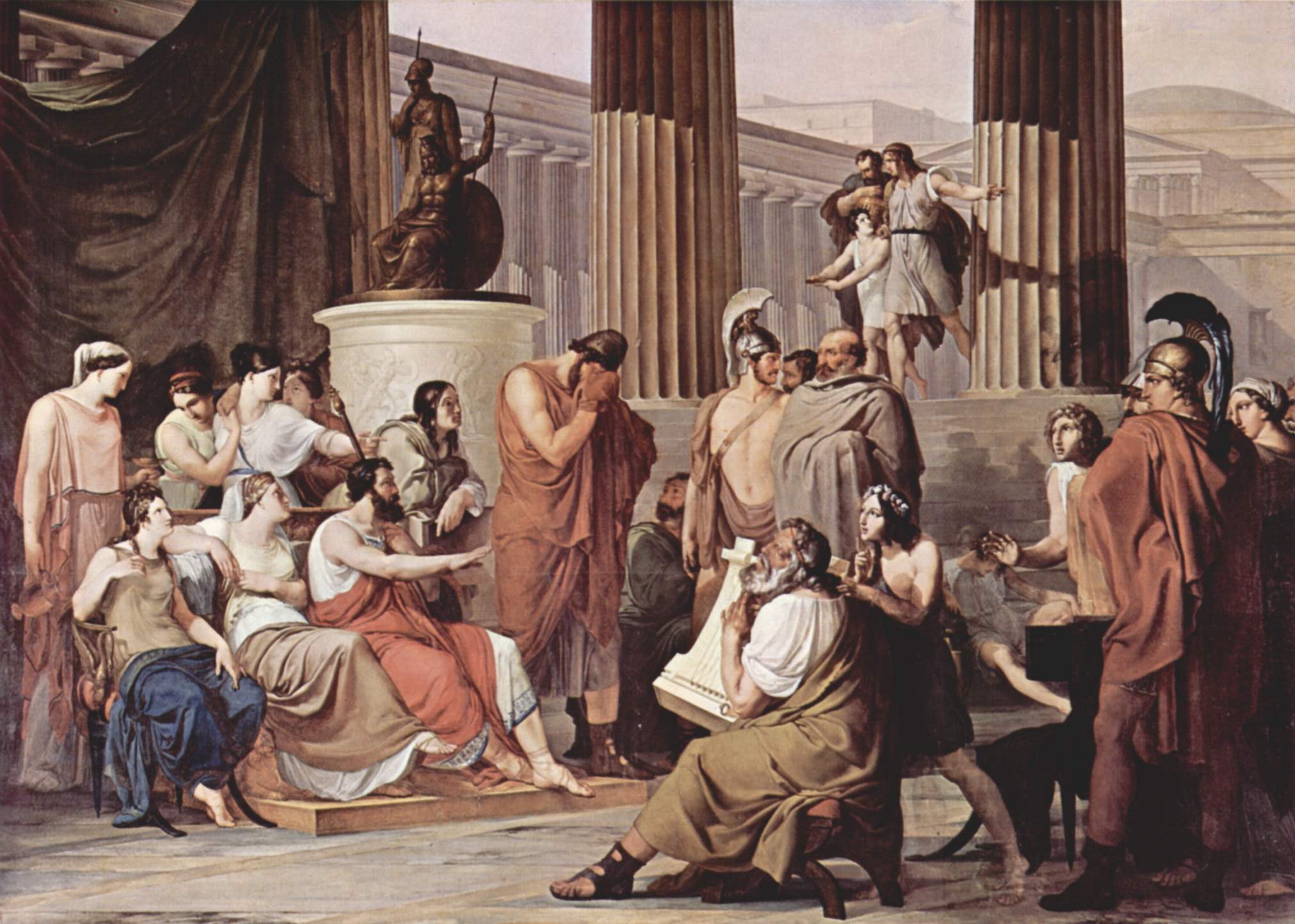|
Qohelet
Ecclesiastes ( ) is one of the Ketuvim ('Writings') of the Hebrew Bible and part of the Wisdom literature of the Christian Old Testament. The title commonly used in English is a Latin transliteration of the Greek translation of the Hebrew word ( or ). An unnamed author introduces "The words of Kohelet, son of David, king in Jerusalem" ( 1:1) and does not use his own voice again until the final verses (12:9–14), where he gives his own thoughts and summarises the statements of Kohelet; the main body of the text is ascribed to Kohelet. Kohelet proclaims (1:2) "Vanity of vanities! All is futile!" The Hebrew word , 'vapor' or 'breath', can figuratively mean 'insubstantial', 'vain', 'futile', or 'meaningless'. In some versions, vanity is translated as 'meaningless' to avoid the confusion with the other definition of vanity. Given this, the next verse presents the basic existential question with which the rest of the book is concerned: "What profit can we show for all our toil, toil ... [...More Info...] [...Related Items...] OR: [Wikipedia] [Google] [Baidu] |
Hebrew Bible
The Hebrew Bible or Tanakh (;"Tanach" . '' Random House Webster's Unabridged Dictionary''. ; ; or ), also known in Hebrew as (; ), is the canonical collection of scriptures, comprising the Torah (the five Books of Moses), the Nevi'im (the Books of the Prophets), and the [...More Info...] [...Related Items...] OR: [Wikipedia] [Google] [Baidu] |
Wisdom Literature
Wisdom literature is a genre of literature common in the ancient Near East. It consists of statements by sages and the wise that offer teachings about divinity and virtue. Although this genre uses techniques of traditional oral storytelling, it was disseminated in written form. The earliest known wisdom literature dates back to the middle of the 3rd millennium BC, originating from ancient Mesopotamia and Egypt. These regions continued to produce wisdom literature over the subsequent two and a half millennia. Wisdom literature from Jewish, Greek, Chinese, and Indian cultures started appearing around the middle of the 1st millennium BC. In the 1st millennium AD, Egyptian-Greek wisdom literature emerged, some elements of which were later incorporated into Islamic thought. Much of wisdom literature can be broadly categorized into two types – conservative "positive wisdom" and critical "negative wisdom" or "vanity literature": * Conservative Positive Wisdom – Pragmatic, r ... [...More Info...] [...Related Items...] OR: [Wikipedia] [Google] [Baidu] |
Old Testament
The Old Testament (OT) is the first division of the Christian biblical canon, which is based primarily upon the 24 books of the Hebrew Bible, or Tanakh, a collection of ancient religious Hebrew and occasionally Aramaic writings by the Israelites. The second division of Christian Bibles is the New Testament, written in Koine Greek. The Old Testament consists of many distinct books by various authors produced over a period of centuries. Christians traditionally divide the Old Testament into four sections: the first five books or Pentateuch (which corresponds to the Jewish Torah); the history books telling the history of the Israelites, from their conquest of Canaan to their defeat and exile in Babylon; the poetic and wisdom literature, which explore themes of human experience, morality, and divine justice; and the books of the biblical prophets, warning of the consequences of turning away from God. The Old Testament canon differs among Christian denominations. The Ea ... [...More Info...] [...Related Items...] OR: [Wikipedia] [Google] [Baidu] |
Midrash
''Midrash'' (;"midrash" . ''Random House Webster's Unabridged Dictionary''. ; or ''midrashot'') is an expansive Judaism, Jewish Bible, Biblical exegesis using a rabbinic mode of interpretation prominent in the Talmud. The word itself means "textual interpretation", "study", or "exegesis", derived from the root verb (), which means "resort to, seek, seek with care, enquire, require". Midrash and rabbinic readings "discern value in texts, words, and letters, as potential revelatory spaces", writes the Hebrew scholar Wilda Gafney. "They reimagine dominant narratival readings while crafting new ones to stand alongside—not replace—former readings. Midrash also asks questions of the text; sometimes it provides answers, sometimes it leaves the reader to answer the questions". Vanessa Lovelace defines midrash as "a Jewish mode of int ... [...More Info...] [...Related Items...] OR: [Wikipedia] [Google] [Baidu] |
Frame Story
A frame story (also known as a frame tale, frame narrative, sandwich narrative, or intercalation) is a literary technique that serves as a companion piece to a story within a story, where an introductory or main narrative sets the stage either for a more emphasized second narrative or for a set of shorter stories. The frame story leads readers from a first story into one or more other stories within it. The frame story may also be used to inform readers about aspects of the secondary narrative(s) that may otherwise be hard to understand. This should not be confused with narrative structure. Notable examples are the ''1001 Nights'' and ''The Decameron''. Origins Some of the earliest frame stories are from ancient Egypt, including one in the Papyrus Westcar, the ''Tale of the Shipwrecked Sailor'', and ''The Eloquent Peasant''. Other early examples are from Indian literature, including the Indian epic poetry, Sanskrit epics ''Mahabharata'', ''Ramayana'', ''Panchatantra'', Syntipas ... [...More Info...] [...Related Items...] OR: [Wikipedia] [Google] [Baidu] |
Abraham Ibn Ezra
Abraham ben Meir Ibn Ezra (, often abbreviated as ; ''Ibrāhim al-Mājid ibn Ezra''; also known as Abenezra or simply ibn Ezra, 1089 / 1092 – 27 January 1164 / 23 January 1167)''Jewish Encyclopedia''online; '' Chambers Biographical Dictionary'' gives the dates 1092/93 – 1167 was one of the most distinguished Jewish biblical commentators and philosophers of the Middle Ages. He was born in Tudela, Taifa of Zaragoza (now Navarre). Biography Abraham Ibn Ezra was born in Tudela, one of the oldest and most important Jewish communities in Navarre. At the time, the town was under the rule of the emirs of the Muslim Taifa of Zaragoza. However, when he later moved to Córdoba, he claimed it was his birthplace. Ultimately, most scholars agree that his place of birth was Tudela. From outside sources, little is known of ibn Ezra's family; however, he wrote of a marriage to a wife who produced five children. While it is believed four died early, the last-born, Isaac, became an influ ... [...More Info...] [...Related Items...] OR: [Wikipedia] [Google] [Baidu] |
Joseph Ibn Kaspi
Joseph ben Abba Meir ben Joseph ben Jacob Ibn Kaspi, also known as Yosef Caspi (1280 Arles—1345 Majorca),Kahan. M. Joseph Kaspi - from Arles to Majorca. ''Iberia Judaica'' VIII 016 pp. 181-192. At https://www.academia.edu/22766219/Kahan_M_JOSEPH_IBN_KASPI_-FROM_ARLES_TO_MAJORCA_._2016_Iberia_Judaica_VIII._pp._181-192. was a Provençal exegete, grammarian, and philosopher, apparently influenced by Averroës. Biography His family hailed from Largentière, from whence his Hebrew surname "Caspi" (made of silver) derived. His Provençal name was Don Bonafous de Largentera, or in French En Bonafoux de L'Argentière. He traveled much, visiting Arles, Tarascon, Aragon, Catalonia, Majorca (where he must have foregathered with Judah Leon ben Moses Mosconi), and Egypt, where, as he says in his ''Tzava'ah'' (ethical will), he hoped to be instructed by the members of Maimonides' family. This hope was not realized, as the descendants of Maimonides were more pious than learned. At one t ... [...More Info...] [...Related Items...] OR: [Wikipedia] [Google] [Baidu] |
Christian David Ginsburg
Christian David Ginsburg (, 25 December 1831 – 7 March 1914) was a Polish-born British Bible scholar and a student of the Masoretic tradition in Judaism. He was born to a Jewish family in Warsaw but converted to Christianity at the age of 15. Coming to England shortly after the completion of his education in the Rabbinic College at Warsaw, Ginsburg continued his study of the Hebrew Scriptures, with particular attention to the '' Megillot''. The first result was a translation of the ''Song of Songs'', with a historical and critical commentary, published in 1857. A similar interpretation of ''Ecclesiastes'', followed by treatises on the Karaites, the Essenes, and the ''Kabbala'', kept the author prominently before biblical students while he was preparing the first sections of his ''magnum opus'', the critical study of the ''Masorah''. Magnum opus Beginning in 1867 with the publication of Jacob ben Hayyim ibn Adonijah's ''Introduction to the Rabbinic Bible, Hebrew and Eng ... [...More Info...] [...Related Items...] OR: [Wikipedia] [Google] [Baidu] |
Writer
A writer is a person who uses written words in different writing styles, genres and techniques to communicate ideas, to inspire feelings and emotions, or to entertain. Writers may develop different forms of writing such as novels, short stories, monographs, travelogues, plays, screenplays, teleplays, songs, and essays as well as reports, educational material, and news articles that may be of interest to the general public. Writers' works are nowadays published across a wide range of media. Skilled writers who are able to use language to express ideas well, often contribute significantly to the cultural content of a society. The term "writer" is also used elsewhere in the arts and music, such as songwriter or a screenwriter, but also a stand-alone "writer" typically refers to the creation of written language. Some writers work from an oral tradition. Writers can produce material across a number of genres, fictional or non-fictional. Other writers use multiple medi ... [...More Info...] [...Related Items...] OR: [Wikipedia] [Google] [Baidu] |
Narration
Narration is the use of a written or spoken commentary to convey a story to an audience. Narration is conveyed by a narrator: a specific person, or unspecified literary voice, developed by the creator of the story to deliver information to the audience, particularly about the plot: the series of events. Narration is a required element of all written stories (novels, short stories, poems, memoirs, etc.), presenting the story in its entirety. It is optional in most other storytelling formats, such as films, plays, television shows and video games, in which the story can be conveyed through other means, like dialogue between characters or visual action. The narrative mode, which is sometimes also used as synonym for narrative technique, encompasses the set of choices through which the creator of the story develops their narrator and narration: * ''Narrative point of view, perspective,'' or ''voice'': the choice of grammatical person used by the narrator to establish whether or ... [...More Info...] [...Related Items...] OR: [Wikipedia] [Google] [Baidu] |
Jerusalem Bible
''The Jerusalem Bible'' (JB or TJB) is an English translation of the Bible published in 1966 by Darton, Longman & Todd. As a Catholic Bible, it includes 73 books: the 39 books shared with the Hebrew Bible, along with the seven deuterocanonical books, as the Old Testament, and the 27 books shared by all Christians as the New Testament. It also contains copious footnotes and introductions. For roughly half a century, the Jerusalem Bible has been the basis of the lectionary for Mass used in Catholic worship throughout much of the English-speaking world outside of North America, though in recent years various bishops' conferences have begun to transition to newer translations, including the English Standard Version, Catholic Edition, in the United Kingdom and India and the Revised New Jerusalem Bible in Australia, New Zealand, and Ireland. History In 1943 Pope Pius XII issued an encyclical letter, '' Divino afflante Spiritu'', which encouraged Catholics to translate the scr ... [...More Info...] [...Related Items...] OR: [Wikipedia] [Google] [Baidu] |




